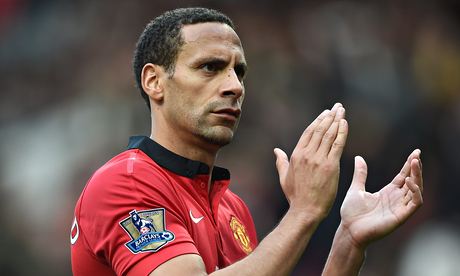
It seems a little odd to suggest Manchester United will miss Rio Ferdinand when the defender himself has been missing for much of the last two seasons, but of course they will. International centre halves who stick around for 12 years, win almost everything in sight and display real leadership on the pitch are not easily replaced.
Sir Alex Ferguson always used to value experience above everything else, and since his arrival from Leeds as an already accomplished player in 2002 Ferdinand has been one of his most prominent cases in point. The former England captain exuded authority on the pitch and in the dressing room, and came to represent continuity at the club almost as much as the manager who signed him. When one considers how much experience and continuity United will lose in parting with Ferdinand and Nemanja Vidic at the same time, it is impossible to escape the conclusion that the void at the heart of the team could spell as much trouble next season as jointly switching the manager and the chief executive did last time round.
It will certainly make life more challenging for a new United manager, who will be presented straight away with a relatively callow and inexperienced central defence, or obliged to bring in a new signing of his own. That is not to say Jonny Evans, Phil Jones and Chris Smalling do not have Old Trafford futures, just that any permutation of those three tends to look like a defence missing a lynchpin. Put yourself for a moment in the position of Luke Shaw, or whoever United's new left-back turns out to be.
Would you rather be joining United to slot in beside Vidic and Ferdinand, or Jones and Smalling? Ferdinand is 35 now and all too clearly cannot last for ever, given his various injury problems he has done well to eke out his Premier League career as long as he has, though Vidic surely has at least another couple of good seasons in him.
The Serb is three years younger than Ferdinand and announced his departure for Internazionale during the final throes of David Moyes' unhappy tenure at United. It is possible that Vidic imagines the slightly slower pace of Italian football will enable him to prolong his career for a few more seasons, as indeed it might, but it is also possible that in a few months he might be looking at United under a new manager and wondering whether it was really necessary to leave.
Certainly, from the club's point of view, if they knew Ferdinand was not to be offered a new contract at the end of the season it seems strange that they did not redouble their efforts to keep hold of Vidic for longer.
Losing two such dependable leaders at once, to paraphrase Oscar Wilde, seems careless rather than accidental.
Looking back over Ferdinand's long career it is the consistency that stands out rather than any particularly colossal performances. As a defender he was pilloried for his occasional mistakes, chiefly a tendency to switch off and lose concentration, though those only stood out because for the most part he performed his task efficiently and well. Tall and quick, at least when he started out at United, he could read most situations and neutralise them, and still had the pace to get him out of trouble if he made a miscalculation.
In the last four or five years he lost some of that sprightliness and had to adapt his game accordingly, which he did well enough to earn continued selection by Ferguson for most of the big games that required experienced players. Unlike Vidic his scoring record was nothing to write home about. Arguably the most famous goal Ferdinand scored for United, a last-minute winner at Anfield in 2006, is remembered mainly for Gary Neville's incendiary run of celebration. He also scored the final Old Trafford goal of the Ferguson years last May with a volley against Swansea, though it was his first in five years.
Like everyone else involved with United, Ferdinand was disappointingly powerless to prevent Barcelona coasting to victory in the Champions League finals that brought the clubs together in 2009 and 2011, though he did have the satisfaction of helping his side knock out Frank Rijkaard's pre-tiki-taka Barça in the semi-final of 2008, a prelude to winning the competition against Chelsea in Moscow.
That, along with the not inconsiderable total of six league titles, will be among Ferdinand's most precious memories. As an England player he won 81 caps but only performed in the finals of World Cup tournaments. He missed out on Euro 2004 (along with that year's FA Cup win) through his own negligence in missing a drug test, and watched Euro 2008 on television along with the rest of Steve McClaren's squad.
Neville famously stood by him in Turkey in 2004, threatening to organise a players' strike in protest at what he perceived as victimisation by the FA when the consequences of his missed drugs appointment were revealed, and the erstwhile 'Red Nev' is still piping up for his former team-mate now. "Rio and Vida allowed to leave at once," Neville has just tweeted. "A conveyor belt has become a cliff!" That might be over-dramatising the case, though all Ferguson's hopes of continuity at Old Trafford are now evaporating. An era has ended. The next United manager may be able to organise a new one, but he will have to get the blueprint off Manchester City first.

